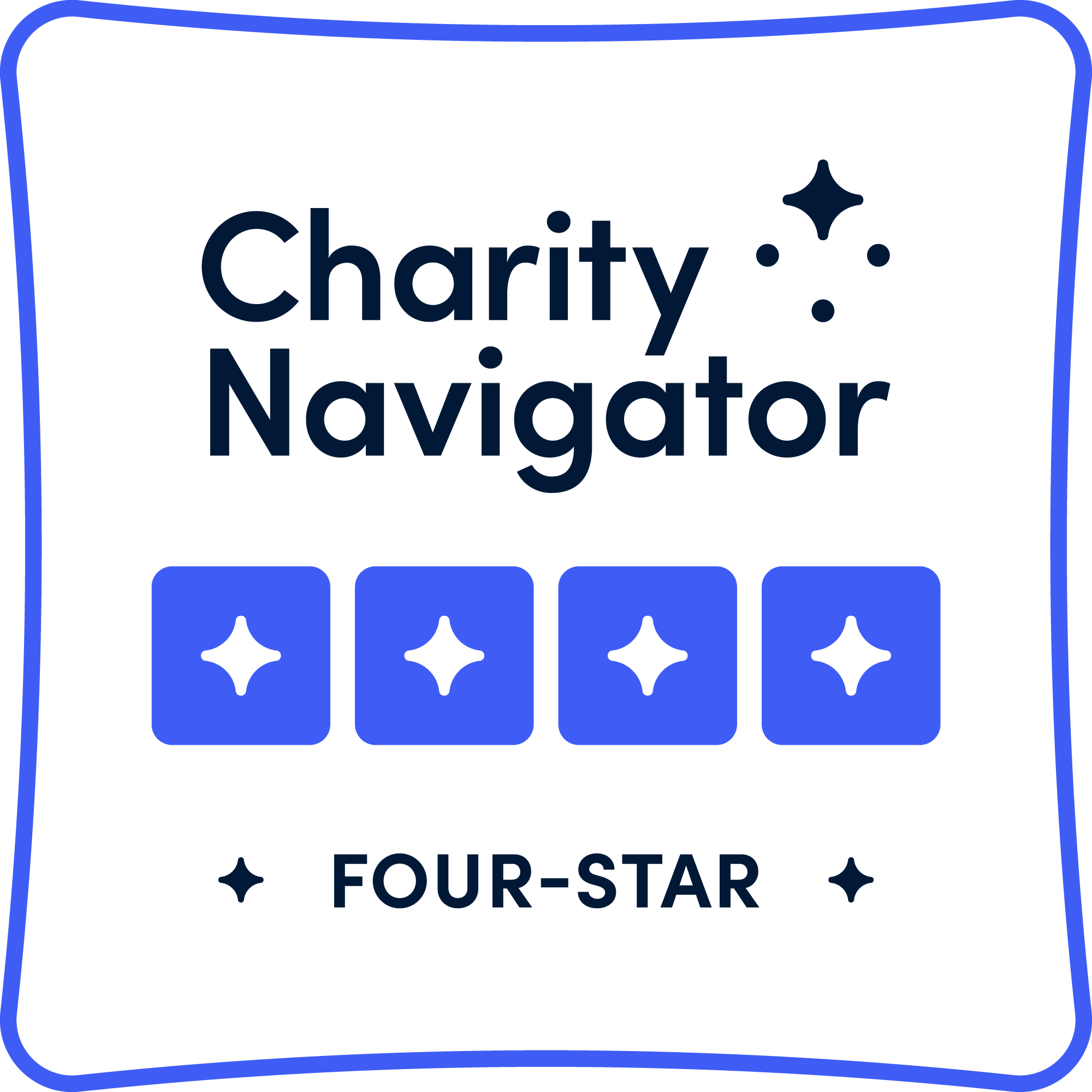Musallam lives with his wife and six children, ranging in age from 9 months to 7 years old, in a structure that consists of 2 small rooms just outside of Rafah, near the Egyptian border. The home has a metallic roof, no windows, no electricity, no running water, and therefore poor sanitation. In short, uninhabitable…
Assalamu alaikum and Ramadan Kareem! We are in the midst of a new Ramadan season. Many of us visit family and friends to break fast throughout the month, often feasting on our favorite foods within the safety of our homes. During this blessed month, we must not forget to care for those who are unable…
Living in Gaza is a challenge for anyone, but today it is especially so with the with electricity running at a mere 4 hours a day, limited availability of clean water, and a blockade that persists, entering its 11th year. Our annual Ramadan Farmers project distributes fresh food to the most marginalized areas, mostly where…
Did you know that 47% of households in Gaza don’t know where their next meal will come from? (OCHA, 2016) Since March 30, over 40 Palestinian protesters, including 5 children, have been killed and over a thousand injured, among them hundreds of children who were attacked with live ammunition. Participation in a demonstration does not constitute…
In Gaza, Women, who account for 49% of the population, bear a heavy share of the burden of economic strangulation imposed by the 11 year blockade. During that time, the number of women seeking employment has increased 200%. Many of these women are highly educated and now find themselves as the breadwinners of their family…
Gaza: Our Duty, Our Children Join us for an event that is sure to both educate and engage guests, informing them of the people and communities we are serving during the month of Ramadan. In the exotic ambience of Phoenicia Restaurant in Glendale California, keynote speaker, Dr. Saree Makdisi will discuss the plight of the…
The humanitarian situation in Gaza is deteriorating on all levels in a downward spiral demanding immediate intervention to prevent a total collapse.
There is a continued sense of despair with 80% of the population relying on aid to survive. Electricity, for those fortunate enough to have it, runs about 5-6 hours a day disrupting basic services to hospitals, health clinics, sewage and water treatment facilities. Three hospitals and ten medical centers have already suspended services due to lack of fuel impacting 300,000 people. According to the World Bank, “access to improved drinking water sources in Gaza declined to one of the worst in the world today”, further reporting that “96% of the water is not suitable for human consumption”.
The blockade on Gaza, now in its 11th year, prevents people and goods from moving, leaving the population isolated and trapped. In 2017, 54 Gazan’s died awaiting ‘permission’ to receive vital treatment outside.
Palestinians in Gaza are suffering. Nearly 12,000 families remain internally displaced since the war in 2014, many of whom are still living in tents. Eighty percent of the 1.9 million people are living on humanitarian aid, without which they could not meet their basic needs. Suicide rates are at an all-time high, and divorce, once…
Once again, the blessed month of Ramadan is upon us, and we at KinderUSA would like to wish you and your families Ramadan Mubarak! KinderUSA’s Ramadan Farmers Food Project is now in its 12th year delivering fresh vegetables, fruit, live poultry and freshly prepared dairy products reaching over 2500 families consisting of 8-13 family members.…
Gaza residents have had their daily electricity usage reduced further after the only power station in Gaza stopped operating. Official reports of reductions from eight hours a day to just six, jeopardizes every aspect of life in Gaza. Water and sanitation services have been severely affected with many households experiencing reduced flow or no water…
Musallam lives with his wife and six children, ranging in age from 9 months to 7 years old, in a structure that consists of 2 small rooms just outside of Rafah, near the Egyptian border. The home has a metallic roof, no windows, no electricity, no running water, and therefore poor sanitation. In short, uninhabitable for small children.
Musallam occasionally works as a fisherman which is a dangerous job since boats will be attacked with live ammunition if they venture outside of 6 nautical miles. But being confined to such a restricted area means fewer and fewer fish are caught.
Unfortunately for Musallam and others like him, there is no other work available that will enable him to feed his family and pay for any discretionary items they may need, such as milk and diapers for his 9 month old. “If something should happen to me, I don’t know how my family will live.”
During our field visits in preparation for the Ramadan distribution, Musallam told us that he has not benefited from any organizations other than the Ministry of Social Affairs who provides dry food aid and a small amount of cash once every 3 months.
Through the generosity of our donors, Musallam and his family have received 2 distributions of fresh food including live chickens, fresh vegetables, and dairy, enough food for the entire month. “This food came at the right time. I did not have any money and I could see the change in my wife and children with the food,” said Musallam.
As for Musallem’s wife, Amal, she says “The situation these days is very difficult, my husband was a former worker in Israel and our situation was excellent, not like these days we don’t have any money.” Crying and finding difficulty talking through the tears, she continues, “Thank you to all who made this possible for our children.”
“The people of Gaza deserve justice and the right to live as dignified human beings,” said Dr. Laila Al-Marayati, KinderUSA Board Chair, “Providing them with healthy, nutritious meals during Ramadan, a month of self-restraint and spiritual reflection, will help restore a portion of the dignity that has been stolen from them.”
During the last days of Ramadan, our distribution continues and you still have time to make an online donation. Our goal is to continue distributing fresh food to families in need beyond Ramadan, funding permitted. Thank you to all who have made this project a continued success.
 Assalamu alaikum and Ramadan Kareem! We are in the midst of a new Ramadan season. Many of us visit family and friends to break fast throughout the month, often feasting on our favorite foods within the safety of our homes. During this blessed month, we must not forget to care for those who are unable to feed their families. These are dire times for many innocent Palestinian children and their families.
Assalamu alaikum and Ramadan Kareem! We are in the midst of a new Ramadan season. Many of us visit family and friends to break fast throughout the month, often feasting on our favorite foods within the safety of our homes. During this blessed month, we must not forget to care for those who are unable to feed their families. These are dire times for many innocent Palestinian children and their families.
This week, thanks to you, we distributed food to over 800 families in Rafah and Khan Yunis. Given their very difficult living conditions, families were beyond thankful to receive our offerings of support. Each food basket includes the following: 4 live chickens, 2 flats of eggs, fresh picked vegetables, freshly made cheese, jams, maftool, and pressed dates. We purchase the food from 40 women cooperatives and 70 small-scale farmers, many of whom lost their land, but now rent a plot to provide and income and food for their families. Your support of this program gives them the start they need to continue!
We are so thankful to be able to ease a portion of each family’s burden during this tough Ramadan season. Yet none of it would be possible without your continued support. The children in Gaza are asking for food, not toys this Ramadan. A donation of just $130 enables KinderUSA to feed a family of 6-8.
Now more than ever, your donation can make a vast difference in the life of a Palestinian child. Help us make a difference in their lives!

__________________________
See below for more photos from our food distributions this past week. 









Living in Gaza is a challenge for anyone, but today it is especially so with the with electricity running at a mere 4 hours a day, limited availability of clean water, and a blockade that persists, entering its 11th year. Our annual Ramadan Farmers project distributes fresh food to the most marginalized areas, mostly where families live in makeshift shelters and rubble from the successive wars. With more than 4,000 people per square kilometer, it remains the most densely populated place in the world.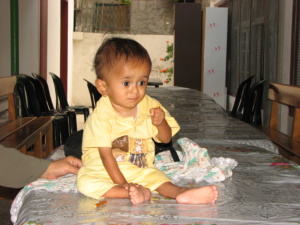
Every year, the goal of the project is to support and ensure the food security of vulnerable households in the Gaza Strip with this year targeting 13 different areas in 4 separate governorates. Year after year, our project increases as more and more families are hungry and in need of nutritious food. This past year, our partner Beit Lahia, served over 26,000 beneficiaries, employed over 95 farmers and over 70 women cooperatives whose families also benefited adding another 1320 beneficiaries. Each family received fresh food inclusive of live chickens, fresh dairy, vegetables, jam, maftoul, and pressed dates to name a few items, twice a month throughout the month of Ramadan.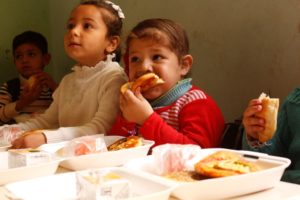
At the close of the project, more funds were available and we continued to serve another 825 families in desperate need for two more months, providing fresh food once in each month. Our office staff in Gaza hear and see firsthand heart wrenching stories about our beneficiaries who are living on the brink. Thank you to all who contributed to this most important KinderUSA project and have not forgotten about the children and their families in Gaza. We could not have served this many people without your generosity!
Our goal for Ramadan 2018 is to feed a minimum of 2500 families of 6-8 and more, an estimated 20,000 people in need. Please help us reach as many families this season as possible. Our work is only possible with your support. May you experience the blessings of Ramadan that come with giving generously to those in need.

Did you know that 47% of households in Gaza don’t know where their next meal will come from?
(OCHA, 2016)
Since March 30, over 40 Palestinian protesters, including 5 children, have been killed and over a thousand injured, among them hundreds of children who were attacked with live ammunition. Participation in a demonstration does not constitute an act of hostility or direct endangerment of life, and certainly is not a justification to use live fire. What is happening is an abhorrent violation of humanitarian law and those responsible should be held responsible. It’s heartbreaking to think that during a time of reflection, peacefulness, and devotion to faith, our children in Palestine could suffer without food through the hot days and long Ramadan nights, while we’re eating our fill.
80% of Palestinians in Gaza rely on humanitarian aid for food, while budgets are being slashed for the global programs they rely on! (Oxfam, 2016)
The protests reflect growing frustration and despair as Gaza becomes unlivable. The situation will further erode as a result of massive cuts to UNRWA imposed by the current US administration. The infrastructure and delivery of services such as sewage treatment are threadbare.
Health services in Gaza are on the brink of collapse while blackouts lasting 18-20 hours have forced the closure of some health facilities. Over one million children are vulnerable to waterborne diseases with 96% of potable water “unfit for human consumption” according to the World Health Organization. More than half of these children are suffering from post-traumatic stress, including fears, anxiety, and nightmares. One of the mothers of our beneficiaries reports that her 8-year-old child, Amer, “screams while sleeping.”
Our upcoming Ramadan Farmers’ project will provide badly needed work and nourishment for over 2500 families. Many of our farmers who live near the border “fence” have risked their lives in preparation for the distribution next week, with some being injured by live ammunition.
 Not only do our farmers and women’s’ cooperatives prepare for the families who will benefit from the distribution, they are also thinking about their own children who are equally suffering.
Not only do our farmers and women’s’ cooperatives prepare for the families who will benefit from the distribution, they are also thinking about their own children who are equally suffering.
Children are every society’s most precious natural resource. Palestinian families are no different. The cruelty in Gaza is hard to witness from a distance. What must it be like on the ground?
Please help us reach as many families this Ramadan as possible. Our work is only possible with your support. May you experience the blessings of Ramadan that come with giving generously to those in need.

In Gaza, Women, who account for 49% of the population, bear a heavy share of the burden of economic strangulation imposed by the 11 year blockade. During that time, the number of women seeking employment has increased 200%. Many of these women are highly educated and now find themselves as the breadwinners of their family after their spouses are either incapacitated from injury or deceased.
Such is the case of Nisreen, a widow caring for her 7 children. She lost her husband to cancer 5 years ago and has struggled to survive ever since. In Gaza, cancer is a death sentence, and not for lack of expertise, but rather for lack of proper treatment due to the siege.
Living in a two room house with no doors, windows, electricity, nor safe water and sanitation, life for Nisreen and her children is unbearable. Her older children want to help, but they too find they increasingly have no options for employment. This kind of despair has led many to the borders over the past few weeks to demonstrate their frustration and desperation.
Sadly, many of the youth have lost all hope, turning to drugs and other negative outlets to help them cope. Children are forced to drop out of school and work in risky occupations to help put food on the table. Cuts to UNRWA, which provides critical services to over 75% of Gaza’s population coupled with non-payment of salaries are leading to a complete collapse across all sectors.
“The lives of these children and their families have value and cannot be taken with impunity,” said Dr. Laila Al-Marayati, KinderUSA Chair, “We have to help replace despair with hope, reminding the global community that Gaza’s children belong to all of us.”
With that in mind, we at KinderUSA along with our implementing partner, Beit Lahia, have implemented a project ensuring food security for 38 female-headed households through the donation 200 chicks along with the essential tools and training required. Nisreen and 37 other women will raise chicks for roasting and laying hens to be included in our Ramadan food package distribution. KinderUSA purchases from the women and will replenish their stock at the close of the month allowing them to sell on the open market to care for their families. With enough support, we can expand this project so that it benefits more families in need, offering them a source of income and dignity throughout the year.
Gaza: Our Duty, Our Children
Join us for an event that is sure to both educate and engage guests, informing them of the people and communities we are serving during the month of Ramadan. In the exotic ambience of Phoenicia Restaurant in Glendale California, keynote speaker, Dr. Saree Makdisi will discuss the plight of the Palestinian children in Gaza and the events that continue to make it unlivable for any human being along with the stunning level of international indifference. Please take a moment to read here Dr. Makdisi’s recent op-ed in the LA times challenging the media and others to tell the truth about Gaza. You will not want to miss his much-anticipated presentation.
In the spirit of Ramadan, our program will also feature Salam Al-Marayati, President of the Muslim Public Affairs Council and Jihad Turk, President of the Bayan Institute at Claremont College. Throughout the evening, you will have opportunities to purchase items from Palestine and make donations supporting our work through the month of Ramadan.
At a time when it is imperative to show our support for the children in Palestine, you are encouraged to attend. Buy your tickets now here, or at the door where ticket prices for Adults, Students, and Children are $75, $55, and $25. We all look forward to seeing you there!
The humanitarian situation in Gaza is deteriorating on all levels in a downward spiral demanding immediate intervention to prevent a total collapse.
There is a continued sense of despair with 80% of the population relying on aid to survive. Electricity, for those fortunate enough to have it, runs about 5-6 hours a day disrupting basic services to hospitals, health clinics, sewage and water treatment facilities. Three hospitals and ten medical centers have already suspended services due to lack of fuel impacting 300,000 people. According to the World Bank, “access to improved drinking water sources in Gaza declined to one of the worst in the world today”, further reporting that “96% of the water is not suitable for human consumption”.
The blockade on Gaza, now in its 11th year, prevents people and goods from moving, leaving the population isolated and trapped. In 2017, 54 Gazan’s died awaiting ‘permission’ to receive vital treatment outside.
(more…)
Palestinians in Gaza are suffering. Nearly 12,000 families remain internally displaced since the war in 2014, many of whom are still living in tents. Eighty percent of the 1.9 million people are living on humanitarian aid, without which they could not meet their basic needs. Suicide rates are at an all-time high, and divorce, once only affecting 2 percent of marriages has skyrocketed to 40 percent, reflecting the increasing stress on Palestinian families.
In April, Gaza’s sole electricity plant ceased to operate and the ripple effects are still being felt. This on top of a fuel crisis that has led to blackouts lasting up to 21 hours imposed due to lack of payment.
According to the World Health Organization, without fuel to run generators, surgical and obstetric operating rooms, neonatal intensive care units and hospital emergency departments will be incapacitated.
Every aspect of life is affected by this fuel catastrophe including sanitation, clean drinking water, and general hygiene. We must not forget that the cruel siege is now entering its 11th year, leaving Gaza in a state of paralysis.
The political division between the governing parties in the West Bank and Gaza creates an environment that neglects the very people both parties profess to represent. Gazans are preoccupied with securing their next meal, finding work, and for those fortunate enough to have electricity, wondering how long it will last.
Beyond Ramadan, our work continues but only with your continued support. “We are worried that the people of Gaza will soon reach the limit of what they can tolerate,” said Dr. Laila Al-Marayati. “They have amazing faith and resilience but there is only so much that families can take.” With our focus on basic needs and economic sustainability, we pray that they will maintain the hope needed to survive and thrive. Please make an online donation today to help a people who only want to help themselves.
 Once again, the blessed month of Ramadan is upon us, and we at KinderUSA would like to wish you and your families Ramadan Mubarak!
Once again, the blessed month of Ramadan is upon us, and we at KinderUSA would like to wish you and your families Ramadan Mubarak!
KinderUSA’s Ramadan Farmers Food Project is now in its 12th year delivering fresh vegetables, fruit, live poultry and freshly prepared dairy products reaching over 2500 families consisting of 8-13 family members. In Gaza, over 80% of the population rely on aid to meet their daily needs. Food is available in markets, however, the many families we serve are unemployed, and many more are female heads of household doing their best to provide for their children.
In Gaza, our partnership continues with Beit Lahia Development Association distributing working with small scaled farmers providing reshly grown vegetables include tomatoes, cucumbers, potatoes, onions, molokhia, eggplant, squash, and carrots, with chicken famers providing 8 live birds to each family along with flats of eggs. Women cooperatives are providing freshly prepared cheese, jam, maftoul, zataar and doqqa.
Our project is much greater this year as the need continues to grow. For a cost of just $125 per family, we are able to increase food security, provide healthful food options during Ramadan, and perhaps, most importantly, increase families’ happiness and joy  during this month of fasting and prayer. Advancing their dignity and that of their families has been the foundation of our work since our launch in 2002 and is ever more prevalent during the month of Ramadan.
during this month of fasting and prayer. Advancing their dignity and that of their families has been the foundation of our work since our launch in 2002 and is ever more prevalent during the month of Ramadan.
Please consider a donation of during the month of Ramadan while also supporting indigent farmers and women cooperatives. A donation of $1000 will provide enough food for 8 needy Palestinian families.
Our work is only possible with you continued support. Thank you for sharing our compassion for the children in Palestine and beyond!

Gaza residents have had their daily electricity usage reduced further after the only power station in Gaza stopped operating. Official reports of reductions from eight hours a day to just six, jeopardizes every aspect of life in Gaza.
Water and sanitation services have been severely affected with many households experiencing reduced flow or no water at all. Hospitals are being forced to significantly reduce essential services, relying on backup generators which will come to a close if funding for fuel is not secured immediately
Approaching Ramadan, our signature Farmers and Women Cooperative program, is being affected just as all aspects of life. “We really only have 4 hours of electricity a day”, according to Hana KinderUSA Country Coordinator. “
Gazan residents are caught in the middle of an ongoing “dispute” between the Palestinian authorities in Gaza and Ramallah in addition to the effects of numerous wars and the ongoing blockade. With Ramadan around the corner, our Farmers are struggling to meet the demand of a population – over 80% – reliant on aid. With the power outages, the irrigation system cannot function properly and crops will be lost.
Most of our beneficiaries lost their homes and their livelihoods during Ramadan 2014. There is a profound sense of frustration and hopelessness throughout Gaza where unemployment is the highest in the world and now they sit once again in darkness. Without a political solution, humanitarian aid is simply drip feeding the population.
We are witnessing so many tragedies across the globe, and are humbled by your continued support of children and their families who rely on us to help them survive in Gaza.
“Your support at this critical time will help sustain children throughout Ramadan and beyond,” said Dr. Laila Al-Marayati, KinderUSA chairperson. Please help us help them and reach our Ramadan goal of raising $250,000 that will go directly to needy families.”

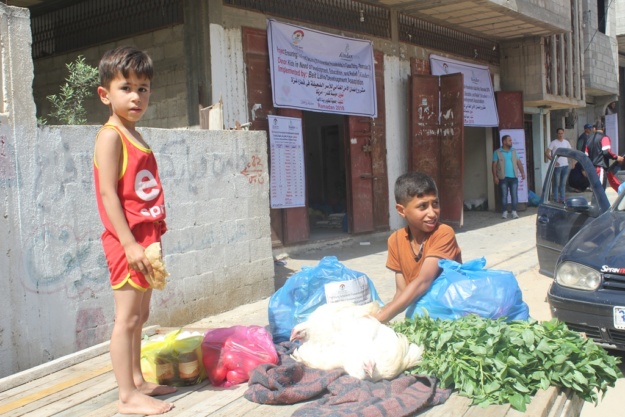
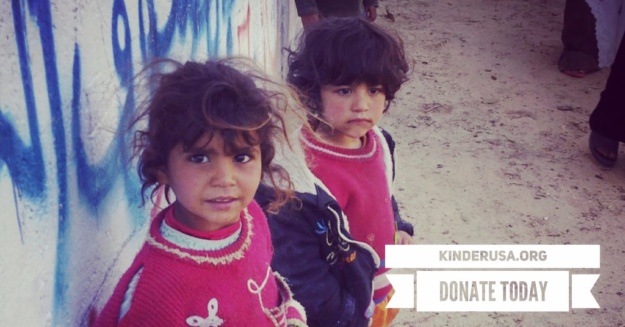
 Assalamu alaikum and Ramadan Kareem! We are in the midst of a new Ramadan season. Many of us visit family and friends to break fast throughout the month, often feasting on our favorite foods within the safety of our homes. During this blessed month, we must not forget to care for those who are unable to feed their families. These are dire times for many innocent Palestinian children and their families.
Assalamu alaikum and Ramadan Kareem! We are in the midst of a new Ramadan season. Many of us visit family and friends to break fast throughout the month, often feasting on our favorite foods within the safety of our homes. During this blessed month, we must not forget to care for those who are unable to feed their families. These are dire times for many innocent Palestinian children and their families.













 Not only do our farmers and women’s’ cooperatives prepare for the families who will benefit from the distribution, they are also thinking about their own children who are equally suffering.
Not only do our farmers and women’s’ cooperatives prepare for the families who will benefit from the distribution, they are also thinking about their own children who are equally suffering. Once again, the blessed month of Ramadan is upon us, and we at KinderUSA would like to wish you and your families Ramadan Mubarak!
Once again, the blessed month of Ramadan is upon us, and we at KinderUSA would like to wish you and your families Ramadan Mubarak! during this month of fasting and prayer. Advancing their dignity and that of their families has been the foundation of our work since our launch in 2002 and is ever more prevalent during the month of Ramadan.
during this month of fasting and prayer. Advancing their dignity and that of their families has been the foundation of our work since our launch in 2002 and is ever more prevalent during the month of Ramadan.
